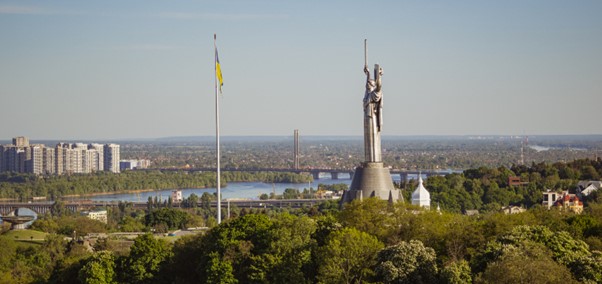

The European Bank for Reconstruction and Development (EBRD) is providing new guarantees to Ukraine’s banking sector and unlocking €690 million of new financing to critical industries in wartime Ukraine.
The Bank is extending unfunded portfolio risk-sharing facilities to PrivatBank, Ukrgasbank, KredoBank and Bank Lviv, under which the EBRD is partially covering the banks’ credit risk on new loans to Ukrainian businesses. This is supported by the European Union’s Ukraine Investment Framework (UIF).
Specifically, the EBRD will cover the credit risk on new loans worth up to €400 million issued by PrivatBank, €150 million issued by Ukrgasbank, €100 million issued by KredoBank, and €30 million issued by Bank Lviv.
This gives these lenders enhanced risk-taking capacity for financing Ukraine’s critical industries in order to safeguard food security and preserve people’s livelihoods at a time when Ukraine’s core economic sectors are being severely impacted by Russia’s invasion.
Up to 20 per cent of the lenders’ respective covered portfolios will be allocated to financing long-term investments by micro-, small- and medium-sized enterprises (MSMEs) in EU-compliant technologies and equipment, under the EU4Business-EBRD Credit Line with incentives. This programme will provide EU funded technical assistance and investment incentives to MSMEs, enabling modernisation and improvement of their business assets. Eligible sub-borrowers will also have access to additional investment incentives for business reconstruction, reintegration and financial inclusion of war veterans through the dedicated “Enterprise Renaissance” and “Veterans Reintegration” windows under the Programme.
These facilities will also be supported by credit risk mitigations and incentives funded by the United States of America through the EBRD’s Crisis Response Special Fund and Canada through the High-Impact Partnership on Climate Action.
Within the portfolio risk-sharing instruments, PrivatBank and Ukrgasbank will enable new lending worth €175 million and €150 million, respectively, under the EBRD’s new Energy Security Support Facility (ESSF), which aims to facilitate energy security investments in Ukraine.
The EBRD has also opened a limit of €10 million under its Trade Facilitation Programme (TFP) for ProCredit Bank. This will enhance ProCredit Bank’s ability to back Ukrainian exporters and importers, strengthening its trade finance operations and meeting the growing demand for foreign trade support.
Since Russia’s full-scale invasion of Ukraine in February 2022, the EBRD has consistently provided innovative and tailored solutions for Ukraine’s financial sector. Through instruments such as the unfunded risk-sharing facilities and trade finance guarantees, the EBRD has enabled over €2.5 billion in crucial financing for Ukraine’s private businesses.
The EBRD is Ukraine’s largest institutional investor. It has deployed more than €4.5 billion in the country since 2022 and has secured agreement for a further €4 billion capital increase to continue lending at these levels in wartime, with the potential for more once full reconstruction begins. As well as supporting the private sector, the EBRD’s strategic priorities in the country include energy security, vital infrastructure, food security and trade.
The EU’s Ukraine Investment Framework is an integral pillar of the €50 billion Ukraine Facility set-up to incentivise public and private investments for the recovery and reconstruction of Ukraine. It is equipped with a financial package totalling €9.3 billion, with €7.8 billion for loan guarantees and €1.51 billion for blended finance and is expected to mobilise up to €40 billion in public and private investments over the next years.